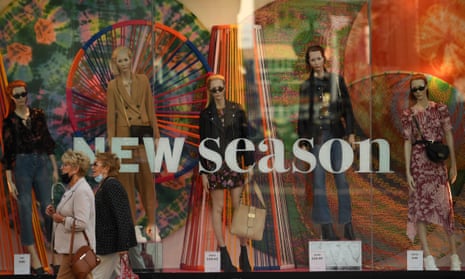UK inflation rose by more than expected in October, fuelled by the rising price of clothing and secondhand cars, according to official figures.
The Office for National Statistics (ONS) said the consumer prices index (CPI) rose to 0.7% in October from 0.5% a month earlier as clothing prices increased, returning to a more normal seasonal pattern after the disruption this year. City economists had forecast an inflation rate of 0.6% for October.
After steep discounting during the first lockdown, as the rapid spread of Covid-19 forced consumers away from the shops, the ONS said prices rose in October at a similar rate to last year.
It comes despite retailers across the country coming under increasing pressure after the second wave of the pandemic forced local lockdowns in England and tougher measures in Scotland, Northern Ireland to contain the virus.
The cost of food also increased slightly last month, in a development analysts said would probably continue into November as restaurants closed due to the renewed restrictions, pushing up demand for goods sold in supermarkets.
The ONS said computer game prices also increased reflecting the release of several new titles ahead of Christmas. Inflation in the price of a secondhand car also soared by more than 10% on a year ago, amid a rush among consumers to buy their own vehicles to reduce their reliance on public transport during the pandemic.
This was partly offset by falls in the cost of energy and holidays as travel companies attempted to lure weary British consumers to take an autumn break. The ONS said the government’s temporary VAT cut for the hospitality sector also continued to keep down the cost of hotel stays and eating out in restaurants.
The latest inflation snapshot comes as the second national lockdown in England triggers a sharp drop in footfall on the high street, with the number of visits to retail outlets plunging by 75% in the first week of November as restrictions were imposed. While online spending has boomed during the pandemic, with more people staying at home, spending in physical shops remains the biggest driver of retail sales.
Despite rising on the month, the rate of inflation remains significantly below the 2% target set by the government for the Bank of England. Threadneedle Street is forecasting subdued levels of inflation over the coming months as the UK economy remains under pressure during the second Covid wave. However, the Bank forecasts price growth will accelerate again towards the end of next year as demand recovers.
Jai Malhi, global market strategist at JP Morgan Asset Management, said British consumers appeared keen to continue spending despite new Covid restrictions. With companies still struggling to operate at full capacity, this would lead to a higher inflation rate than might be expected. “Further good news of a potential working vaccine may now be around the corner, and so the path from here may get smoother yet,” he said.
However, analysts said price rises would probably remain subdued in the near future, as the second wave of coronavirus infections pushes the economy into a double-dip recession.
Tom Stevenson, an investment director at the fund manager Fidelity International, said: “While prices are on an upwards path, rises are likely to be subdued for a while longer. Covid infections are still increasing, large swathes of the UK are under strict lockdown rules, restricting opportunities to spend, and unemployment is climbing.”
After recording rapid growth in the three months to September as the economy reopened from the first lockdown, gross domestic product (GDP) is expected to plunge in the final three months of the year.
Economists said a no-deal Brexit could trigger a surge in inflation early next year, warning that failure to strike an agreement before the transition period expires at the end of December could spark a sell-off in the pound. This would drive up the cost of importing goods to Britain.
Paul Dales, the chief UK economist at the consultancy Capital Economics, said: “While it [inflation] will rise more significantly from next April, we doubt that it will spend much time above the 2% target. That is unless a no-deal Brexit pushes it up to a peak of 3%-4%.”
